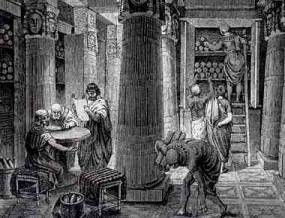
Art.6: Everyone has the right to recognition everywhere as a person before the law.
(Universal Human Rights Declaration)
As part of the Ottoman Empire, Egypt devolved to the non-Muslim communities, under the Millet system, the sole responsibility for maintaining civil registers recording births, marriages, divorces, conversions and deaths. The Egyptian authorities started in 1925 to register the births of Egyptian citizens only. The Registers in Alexandria date back to 1830 and cover a community that numbered 40,000 in its heyday. Today, an ageing population of some 15 individuals are the last remaining custodians of around 255 Registers containing some 60,000 pages. The same applies to Cairo where some of the registers (of the Ashkenazim and the Karaites) have already been scattered or lost.
None of these Registers pertain to personal property. They are of vital importance for the following reasons:
Adding to the lack of religious authority and the frail condition of those in charge, the documents themselves are stored in precarious conditions with no back-up copy.
The Association Internationale Nebi Daniel proposes to safeguard and legitimise these registers for posterity by:
Forbidding to copy of these religious Registers seems hard to justify. The Egyptian government claims that the decision rests solely with the Community, whilst the Community claims that the government forbids an entire copy to leave the country. Our Association urges the Egyptian government to formally authorise this initiative by issuing a clear and unambiguous ruling that will enable all parties concerned to act in a legitimate and transparent manner.
 This act of tolerance and “good-will”, positive for Egypt’s image, would encourage Jews to participate financially in the restoration, maintenance and promotion of Jewish heritage sites as an added tourist attraction for Egypt, as witnessed in Spain, Rhodes, Budapest and Prague.
This act of tolerance and “good-will”, positive for Egypt’s image, would encourage Jews to participate financially in the restoration, maintenance and promotion of Jewish heritage sites as an added tourist attraction for Egypt, as witnessed in Spain, Rhodes, Budapest and Prague.
This situation has led to important Community documents being illegally removed and exported out of frustration. Part of the Cairo registers, covering the period 1936-47 are at the Yeshiva University in New York. Some documents from Alexandria and Cairo have found their way to the CAHJP in Jerusalem. To further underline our point, a collection of stolen documents was recently offered to our association, which we refused to consider so as not to encourage this kind of trade. It is sad that our heritage is being scavenged for commercial purposes.
Should we not seek alternative ways to prevent the frittering away of our heritage, whether for the best of intentions to safeguard it, or out of greed?